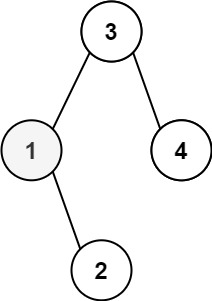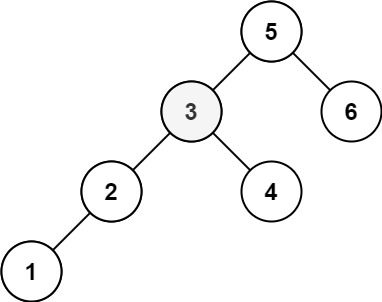Description
Given the root of a binary search tree, and an integer k, return the kth smallest value (1-indexed) of all the values of the nodes in the tree.
Example 1:

Input: root = [3,1,4,null,2], k = 1 Output: 1
Example 2:

Input: root = [5,3,6,2,4,null,null,1], k = 3 Output: 3
Constraints:
- The number of nodes in the tree is
n. 1 <= k <= n <= 1040 <= Node.val <= 104
Follow up: If the BST is modified often (i.e., we can do insert and delete operations) and you need to find the kth smallest frequently, how would you optimize?
Code
使用 Binary Tree Inorder Traversal,因為 inorder traversal 就是由小到大。
/**
* Definition for a binary tree node.
* struct TreeNode {
* int val;
* TreeNode *left;
* TreeNode *right;
* TreeNode() : val(0), left(nullptr), right(nullptr) {}
* TreeNode(int x) : val(x), left(nullptr), right(nullptr) {}
* TreeNode(int x, TreeNode *left, TreeNode *right) : val(x), left(left), right(right) {}
* };
*/
class Solution {
public:
int kthSmallest(TreeNode* root, int k) {
stack<TreeNode*> st;
while(root || !st.empty()) {
while(root) {
st.push(root);
root = root->left;
}
root = st.top(); st.pop();
if(--k == 0) break;
root = root->right;
}
return root->val;
}
};